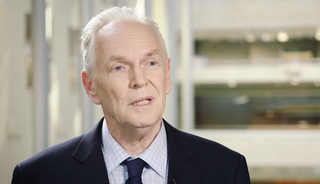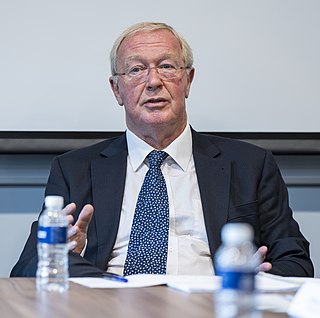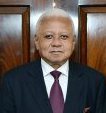Judicial independence is the concept that the judiciary should be independent from the other branches of government. That is, courts should not be subject to improper influence from the other branches of government or from private or partisan interests. Judicial independence is important to the idea of separation of powers.

Richard Joseph Goldstone is a South African former judge. After working for 17 years as a commercial lawyer, he was appointed by the South African government to serve on the Transvaal Supreme Court from 1980 to 1989 and the Appellate Division of the Supreme Court of South Africa from 1990 to 1994.
The judicial system of Ukraine is outlined in the 1996 Constitution of Ukraine. Before this there was no notion of judicial review nor any Supreme court since 1991's Ukrainian independence. when it started being slowly restructured.

Boris Ottokar Dittrich is a Dutch politician of the Democrats 66 (D66) party, jurist, author and human rights activist. He is a Member of the Senate since 11 June 2019.

David Michael Crane is an American lawyer who was the Chief Prosecutor of the Special Court for Sierra Leone (SCSL) from April 2002 until July 15, 2005. During his tenure, he indicted, among others, the then-President of Liberia, Charles Taylor. Crane was replaced as chief prosecutor by his deputy Desmond de Silva. On April 26, 2012, the SCSL, sitting in The Hague, convicted Taylor on various charges. Crane served as Professor of Practice at Syracuse University College of Law from 2006 until 2018.

Serge, Brammertz is a Belgian prosecutor, academic and jurist. He serves as the chief prosecutor for the International Residual Mechanism for Criminal Tribunals (IRMCT) since 2016. He also served as the chief prosecutor for the International Criminal Tribunal for the former Yugoslavia from 2008 until its closure in 2017.
The International Association of Prosecutors (IAP) is a global non-governmental organisation of prosecutors, established by the United Nations in 1995, Vienna. It has 183 organizational members from 177 countries, and individual members.

Hassan Bubacar Jallow is a Gambian judge who has served as Chief Justice of the Gambia since February 2017. He was the Prosecutor of the International Criminal Tribunal for Rwanda (ICTR) from 2003 to 2016, and Prosecutor of the Mechanism for International Criminal Tribunals (MICT) from 2012 to 2016, both at the rank of United Nations Under Secretary-General. He served as Minister of Justice and Attorney General from 1984 to 1994 under President Dawda Jawara.

Oleksandr Volodymyrovych Lavrynovych is a Ukrainian physicist, lawyer, politician, former member of the Supreme Council of Justice of Ukraine, a former Ukrainian member of parliament and former Minister of Justice of Ukraine. He is a Merited Jurist of Ukraine (2003). He was one of the founders of the first democratic party in Ukraine in 1989 – People's Movement of Ukraine and considered to be one of the "fathers" of the independence of Ukraine from the Soviet Union.

The judicial system of Sweden consists of the law of Sweden and a number of government agencies tasked with upholding security and rule of law within the country. The activities of these agencies include police and law enforcement, prosecution, courts, and prisons and other correctional services.

Raymond de Roon is a Dutch politician and former prosecutor. As a member of the Party for Freedom he has been an MP since 30 November 2006. He focuses on matters of foreign policy, military operations and the European Union.

Sir Howard Andrew Clive Morrison, is a British lawyer and from 2011 to 2021 a Judge of the International Criminal Court based in The Hague, Netherlands. Currently UK advisor on war crimes to the Ukrainian Prosecutor General.
Ekaterina Trendafilova is a Bulgarian lawyer and judge with international and domestic experience. She is currently serving as the first President of the Kosovo Specialist Chambers – a position to which she was appointed in December 2016 for a four-year term and took her office on 12 January 2017.

The Judiciary of Bahrain is the court system of Bahrain. It is divided into three branches: the Civil Law Courts, the Criminal Law Courts and the Shari'a Law Courts. The Civil Law Courts deal with all commercial, civil, as well disputes related to the personal status of non-Muslims. The Shari’a Law Courts have jurisdiction over all issues related to the personal status of Muslims.

Mohamed Chande Othman is a Tanzanian lawyer and a former Chief Justice of Tanzania.
Jacob Wit is a justice of the Caribbean Court of Justice, located in Trinidad and Tobago. Since 2010 he also serves as the President of the Constitutional Court of Sint Maarten, and is a former Judge of the Rotterdam District Court and the Common Court of Justice of the Netherlands Antilles and Aruba.

Dr. Bimal N. Patel is Professor of International Law and Vice-Chancellor of the Rashtriya Raksha University, an Institute of National Importance of India, established by the Parliament of India through RRU Act No. 31, by the Ministry of Home Affairs, Government of India. The headquarters of the University is in Gandhinagar, Gujarat, India. Professor Patel has been serving as a Member of the National Security Advisory Board, an advisory board to the National Security Council headed by the Prime Minister of India. He is a member of the Financial Sector Regulatory Appointments Search Committee (FSRASC), headed by the Cabinet Secretary, established by the Appointments Committee of the Cabinet (ACC) to make recommendations of candidates for the top positions of the financial regulators of India – Reserve Bank of India, Securities and Exchange Board of India, Pension Fund Regulatory and Development Authority of India, Insurance Regulatory and Development Authority of India, Insolvency and Bankruptcy Board of India and International Financial Services Centre Authority. Dr. Patel served as the Director of the Gujarat National Law University, Gandhinagar for two consecutive terms (2008-2019). He was appointed by a high-level committee headed by the then Chief Justice of India, K G Balakrishnan, at the Supreme Court of India. He served as a member of the 21st Law Commission of India, headed by Justice Balbir Singh Chauhan, Supreme Court of India, and contributed independently or jointly 15 reports or referrals by the Supreme Court of India, including among others, criminal justice reforms, one nation-one election, sedition law, tribunalisation of justice system and prepared consolidated report on all Central Acts of India from 1834 to 2017. He is also one of the Lead Academic Advisers to India for India’s tenure as a member of the UN Security Council 2021-22. He is a member of the Editorial Board of the ICRC International Review of the Red Cross, Geneva. He has served or serves various governmental and public sector organisations and academic institutions. His publications on India and International Law and Responsibility of International Organisations are reviewed and referred by international law scholars and journals. Patel is a former international civil servant, scholar, and academician of international law and diplomacy. An international law jurist, he has extensively studied, researched, commented, and published works on the administrative, procedural and substantive jurisprudence of the International Court of Justice (ICJ), International Tribunal for the Law of the Sea (ITLOS), International Criminal Tribunal for former Yugoslavia (ICTY) and International Labour Organization Administrative Tribunal (Geneva). He has published, edited several books, research papers/articles/surveys in leading academic and international law journals. He has been involved in drafting several national and state primary and secondary legislation, regulations, rules. He has delivered and served as Visiting Faculty at universities in Asia-Pacific and Europe. He has served at the Organisation for the Prohibition of Chemical Weapons, the Hague, Netherlands.
Johannes "Jos" Silvis is a Dutch law professor and judge. He was a judge at the European Court of Human Rights from 1 November 2012 through 1 September 2016. He subsequently became attorney general at the Supreme Court of the Netherlands.

The Kosovo Specialist Chambers and Specialist Prosecutor's Office is a court of Kosovo, located in The Hague (Netherlands), hosting four Specialist Chambers and the Specialist Prosecutors Office, which may perform their activities either at the KRSJI or in Kosovo. The court is currently set up for delegating the trials of the crimes committed by members of the Kosovo Liberation Army (KLA), an ethnic-Albanian paramilitary organisation which sought the separation of Kosovo from Yugoslavia during the 1990s and the eventual creation of a Greater Albania. The alleged crimes concern the period 1998–2000, during and at the end of the Kosovo war and directed afterwards against "ethnic minorities and political opponents". The court was formally established in 2016. It is separate from other Kosovar institutions, and independent. It is composed of a Specialist Prosecutor's Office and four Specialist Chambers, with themselves comprising Judges' Chambers and a Registry.

The Judiciary of the Netherlands is the system of courts which interprets and applies the law in the Netherlands.














